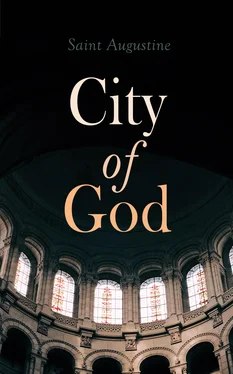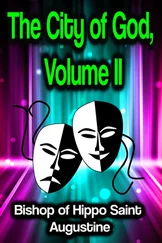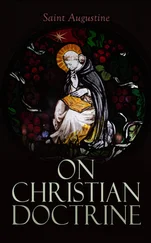7. Concerning the likeness and agreement of the fabulous and civil theologies.
That theology, therefore, which is fabulous, theatrical, scenic, and full of all baseness and unseemliness, is taken up into the civil theology; and part of that theology, which in its totality is deservedly judged to be worthy of reprobation and rejection, is pronounced worthy to be cultivated and observed;—not at all an incongruous part, as I have undertaken to show, and one which, being alien to the whole body, was unsuitably attached to and suspended from it, but a part entirely congruous with, and most harmoniously fitted to the rest, as a member of the same body. For what else do those images, forms, ages, sexes, characteristics of the gods show? If the poets have Jupiter with a beard, and Mercury beardless, have not the priests the same? Is the Priapus of the priests less obscene than the Priapus of the players? Does he receive the adoration of worshippers in a different form from that in which he moves about the stage for the amusement of spectators? Is not Saturn old and Apollo young in the shrines where their images stand, as well as when represented by actor's masks? Why are Forculus, who presides over doors, and Limentinus, who presides over thresholds and lintels, male gods, and Cardea between them feminine, who presides over hinges? Are not those things found in books on divine things, which grave poets have deemed unworthy of their verses? Does the Diana of the theatre carry arms, whilst the Diana of the city is simply a virgin? Is the stage Apollo a lyrist, but the Delphic Apollo ignorant of this art? But these things are decent compared with the more shameful things. What was thought of Jupiter himself by those who placed his wet nurse in the Capitol? Did they not bear witness to Euhemerus, who, not with the garrulity of a fable-teller, but with the gravity of an historian who had diligently investigated the matter, wrote that all such gods had been men and mortals? And they who appointed the Epulones as parasites at the table of Jupiter, what else did they wish for but mimic sacred rites? For if any mimic had said that parasites of Jupiter were made use of at his table, he would assuredly have appeared to be seeking to call forth laughter. Varro said it,—not when he was mocking, but when he was commending the gods did he say it. His books on divine, not on human, things testify that he wrote this,—not where he set forth the scenic games, but where he explained the Capitoline laws. In a word, he is conquered, and confesses that, as they made the gods with a human form, so they believed that they are delighted with human pleasures.
For also malign spirits were not so wanting to their own business as not to confirm noxious opinions in the minds of men by converting them into sport. Whence also is that story about the sacristan of Hercules, which says that, having nothing to do, he took to playing at dice as a pastime, throwing them alternately with the one hand for Hercules, with the other for himself, with this understanding, that if he should win, he should from the funds of the temple prepare himself a supper, and hire a mistress; but if Hercules should win the game, he himself should, at his own expense, provide the same for the pleasure of Hercules. Then, when he had been beaten by himself, as though by Hercules, he gave to the god Hercules the supper he owed him, and also the most noble harlot Larentina. But she, having fallen asleep in the temple, dreamed that Hercules had had intercourse with her, and had said to her that she would find her payment with the youth whom she should first meet on leaving the temple, and that she was to believe this to be paid to her by Hercules. And so the first youth that met her on going out was the wealthy Tarutius, who kept her a long time, and when he died left her his heir. She, having obtained a most ample fortune, that she should not seem ungrateful for the divine hire, in her turn made the Roman people her heir, which she thought to be most acceptable to the deities; and, having disappeared, the will was found. By which meritorious conduct they say that she gained divine honours.
Now had these things been feigned by the poets and acted by the mimics, they would without any doubt have been said to pertain to the fabulous theology, and would have been judged worthy to be separated from the dignity of the civil theology. But when these shameful things,—not of the poets, but of the people; not of the mimics, but of the sacred things; not of the theatres, but of the temples, that is, not of the fabulous, but of the civil theology,—are reported by so great an author, not in vain do the actors represent with theatrical art the baseness of the gods, which is so great; but surely in vain do the priests attempt, by rites called sacred, to represent their nobleness of character, which has no existence. There are sacred rites of Juno; and these are celebrated in her beloved island, Samos, where she was given in marriage to Jupiter. There are sacred rites of Ceres, in which Proserpine is sought for, having been carried off by Pluto. There are sacred rites Venus, in which, her beloved Adonis being slain by a boar's tooth, the lovely youth is lamented. There are sacred rites of the mother of the gods, in which the beautiful youth Atys, loved by her, and castrated by her through a woman's jealousy, is deplored by men who have suffered the like calamity, whom they call Galli. Since, then, these things are more unseemly than all scenic abomination, why is it that they strive to separate, as it were, the fabulous fictions of the poet concerning the gods, as, forsooth, pertaining to the theatre, from the civil theology which they wish to belong to the city, as though they were separating from noble and worthy things, things unworthy and base? Wherefore there is more reason to thank the stage-actors, who have spared the eyes of men, and have not laid bare by theatrical exhibition all the things which are hid by the walls of the temples. What good is to be thought of their sacred rites which are concealed in darkness, when those which are brought forth into the light are so detestable? And certainly they themselves have seen what they transact in secret through the agency of mutilated and effeminate men. Yet they have not been able to conceal those same men miserably and vilely enervated and corrupted. Let them persuade whom they can that they transact anything holy through such men, who, they cannot deny, are numbered, and live among their sacred things. We know not what they transact, but we know through whom they transact; for we know what things are transacted on the stage, where never, even in a chorus of harlots, hath one who is mutilated or an effeminate appeared. And, nevertheless, even these things are acted by vile and infamous characters; for, indeed, they ought not to be acted by men of good character. What, then, are those sacred rites, for the performance of which holiness has chosen such men as not even the obscenity of the stage has admitted?
8. Concerning the interpretations, consisting of natural explanations, which the pagan teachers attempt to show for their gods.
But all these things, they say, have certain physical, that is, natural interpretations, showing their natural meaning; as though in this disputation we were seeking physics and not theology, which is the account, not of nature, but of God. For although He who is the true God is God, not by opinion, but by nature, nevertheless all nature is not God; for there is certainly a nature of man, of a beast, of a tree, of a stone,—none of which is God. For if, when the question is concerning the mother of the gods, that from which the whole system of interpretation starts certainly is, that the mother of the gods is the earth, why do we make further inquiry? why do we carry our investigation through all the rest of it? What can more manifestly favour them who say that all those gods were men? For they are earth-born in the sense that the earth is their mother. But in the true theology the earth is the work, not the mother, of God. But in whatever way their sacred rites may be interpreted, and, whatever reference they may have to the nature of things, it is not according to nature, but contrary to nature, that men should be effeminates. This disease, this crime, this abomination, has a recognised place among those sacred things, though even depraved men will scarcely be compelled by torments to confess they are guilty of it. Again, if these sacred rites, which are proved to be fouler than scenic abominations, are excused and justified on the ground that they have their own interpretations, by which they are shown to symbolize the nature of things, why are not the poetical things in like manner excused and justified? For many have interpreted even these in like fashion, to such a degree that even that which they say is the most monstrous and most horrible,—namely, that Saturn devoured his own children,—has been interpreted by some of them to mean that length of time, which is signified by the name of Saturn, consumes whatever it begets; or that, as the same Varro thinks, Saturn belongs to seeds which fall back again into the earth from whence they spring. And so one interprets it in one way, and one in another. And the same is to be said of all the rest of this theology.
Читать дальше












